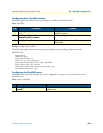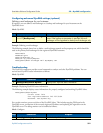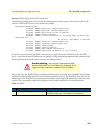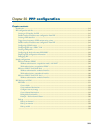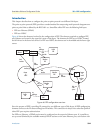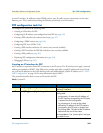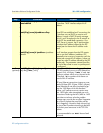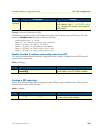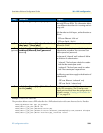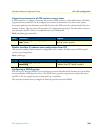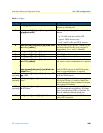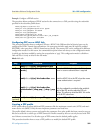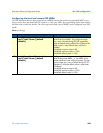
PPP configuration task list 316
SmartWare Software Configuration Guide 30 • PPP configuration
3 node(if-ip)[name]#ipaddress
unnumbered
or
node(if-ip)[name]#ipaddress dhcp
or
node(if-ip)[name]# ipaddress ip-address
netmask
The PPP remote peer offers an IP address for the
IP interface. The IP interface adopts this IP
address
Once PPP has established an IP connection, the
IP interface can use DHCP to acquire an IP
address. It sends a DHCP Discover message
(which is an IP broadcast) to the IP network to
which PPP has established connection. If no
DHCP Server is present, the IP interface does
not adopt the IP address offered by the PPP
remote peer but leaves the IP address unde-
fined.
The IP interface requests from the PPP remote
peer to use the IP address ip-address. PPP
repeatedly tries to set-up a connection until the
remote peer accepts this IP address. It does not
accept any other IP address offered by the PPP
remote peer. The parameter netmask specifies
the size of the subnet in case ‘no point-to-point’
is configured
4
(optional)
node(if-ip)[name]# [no] tcp adjust-mss {
rx | tx } { mtu | mss }
Limits to the MSS (Maximum Segment Size) in
TCP SYN packets to mss or to MTU (Maximum
Transmit Unit) - 40 Bytes, if ‘mtu’ is used. ‘rx’
applies to packets which arrive inbound at this
IP interface, ‘tx’ to packets which leave out-
bound of this IP interface.
PPP over Ethernet connections impose an over-
head of 8 Bytes (PPP: 2 Bytes, PPPoE: 6 Bytes).
Some Ethernets do not allow payloads larger
than the 1500 Bytes which the standard
defines, so IP packets must not contain more
than 1492 bytes when transmitted over such
connections. Reducing the MTU/MRU to 1492
Bytes does not always solve the problem
because many sources do not allow fragmenta-
tion of the IP packets they send (they set the
‘Don’t fragment’). However, these sources limit
the size of the IP packets according to the MSS
which their peers announce in the TCP SYN
packets.
It is recommended to use ‘mtu’ inbound and
outbound.
Step Command Purpose





